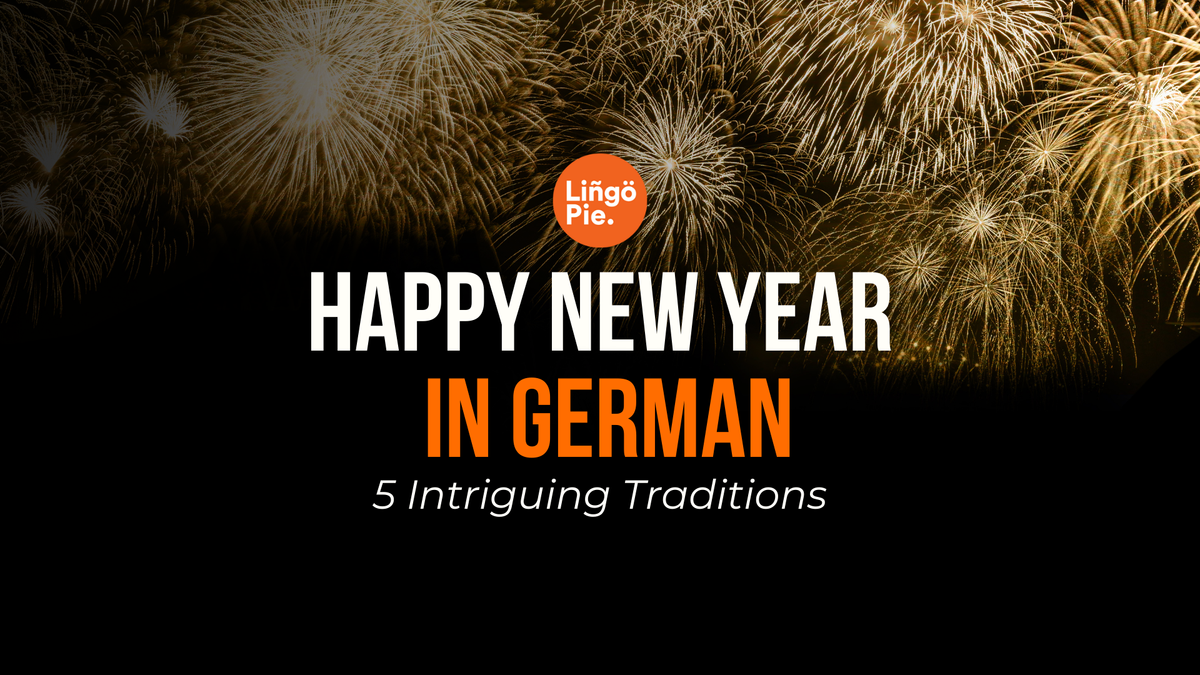"Guten Rutsch!" The friendly cashier grinned at me as I grabbed my groceries on New Year's Eve. I froze, not knowing what to say. It was my first New Year in Germany, and while I had figured out how to manage basic conversations, I hadn't thought of learning how to say "Happy New Year." I ended up mumbling an awkward "Danke" and leaving the store, feeling a little embarrassed.
Living abroad comes with its challenges, and celebrating the New Year in Germany is no different. Germans have their own way of welcoming the new year, including phrases like "Gutenrutsch" and traditions like Blei Gießen (pouring molten lead to predict the future). In this article, I'll share what I've learned since that awkward moment, including how to say "Happy New Year" in German, some useful phrases, and a closer look at the traditions related to the holiday.
Table of Content

How To Say "Happy New Year" In German
If you want to wish someone a Happy New Year in German, the most common phrase is "Frohes neues Jahr!" It's easy to remember and means exactly the same as "Happy New Year!" You can use it with anyone—friends, family, or even a stranger at the store.
But before midnight on New Year's Eve, many Germans will say, "Guten Rutsch!" This phrase literally means "Good slide!" It is used to wish someone a smooth and happy start to the new year. The first time I heard it, I was confused—what does sliding have to do with New Year's? But it's just a humorous and cheerful way to send good vibes for the year ahead.
There’s also a more formal option: “Ein glückliches neues Jahr!” This means "A Happy New Year" and is a little more polished. Don't worry too much about saying it perfectly. Just smiling and saying "Frohes neues Jahr!" will make people happy.

- How to Say Merry Christmas in German + 7 Traditions You Must Know
- How To Say Thank You In German? 18 Natural Ways
- German Possessive Pronouns vs. Possessive Adjectives [Guide]
Intriguing German New Year Traditions
Celebrating New Year's in Germany has been such an experience. Some of these customs were a total surprise to me during my first year here—and they're part of what makes the holiday so interesting. Let me share a few traditions that stood out:
1. Pouring Lead For Luck: Bleigießen
This one felt straight out of a Harry Potter movie the first time I saw it! Bleigießen, or lead pouring, is a classic German New Year's tradition. The idea is simple: you melt a tiny piece of lead (or, nowadays, wax for safety) over a candle flame, then drop it into cold water. The resulting shape is supposed to predict your future. A heart? Love is on the horizon. A ship? Maybe a big trip is coming your way. While I'm not sure how accurate it is, it's definitely a really interesting tradition!
2. Lucky Pigs And Four-Leaf Clovers
If someone gives you a tiny marzipan pig on New Year's, don't be confused—it's a good thing! Pigs, or Glücksschweine, are symbols of luck in Germany. They're often paired with four-leaf clover or even tiny chimney sweeper figurines, which are also considered lucky.
3. Linsensuppe (Lentil Soup)
This tradition is simple, tasty, and full of meaning. On New Year's Day, many Germans eat Linsensuppe, or lentil soup. The lentils look like tiny coins, so they're seen as a symbol of money and good fortune. Eating lentil soup is believed to bring wealth and luck in the year ahead.
4. Toast With Sekt
Germans love sparkling wine, and no New Year's celebration is complete without a glass of Sekt. It feels like a must to pop the cork on a bottle of sparkling wine at midnight, whether you're celebrating with friends or just enjoying a quiet evening. It's affordable, bubbly, and tastes just as festive as champagne!
5. The First Visitor Superstition
In some parts of Germany, there's a belief that the first person to visit your home in the new year brings luck (or not). This is why people pay attention to who crosses the threshold first after midnight—it's like a real-life good luck charm!
New Year-Related Vocabulary In German
To celebrate New Year's in Germany, it helps to know a few essential words and phrases. Here's a handy vocabulary table to get you started!
Celebrate The New Year By Learning German With Lingopie!
New Year's in Germany is full of fun traditions, like wishing "Guten Rutsch," eating Linsensuppe for luck, and enjoying fireworks. It's a time to enjoy meaningful traditions and start the year in a positive spirit.
If you're interested in learning more about the German language and culture, Lingopie is the way to go. It is a fun and interactive platform that helps you learn German through TV shows, movies, and more.
What better way to start the new year than by learning German? Sign up for Lingopie and start learning right away!
FAQs About New Year in Germany
If you're curious about how New Year's is celebrated in Germany beyond the traditions we've covered, look no further! Here are some answers to common questions that will give you more insight into German New Year's customs and what to expect during the festivities.
1. Do Germans Make New Year's Resolutions?
Yes, many Germans make New Year's resolutions, just like in other countries. Common resolutions include getting fit, spending more time with family, or traveling. Some also focus on starting new hobbies or improving personal habits.
2. What Is "Dinner for One" and Why Do Germans Watch It on New Year's Eve?
"Dinner for One" is a quirky British comedy sketch that's become a beloved New Year's Eve tradition in Germany. Despite being over 50 years old and in English, it's shown on TV in Germany every year. It's a fun, timeless tradition that adds some humor to the celebrations.
3. Is It Common to Exchange Gifts for New Year in Germany?
No, exchanging gifts isn't a big tradition for New Year's in Germany. Most people focus more on spending time with loved ones, enjoying a nice meal, and celebrating the occasion. However, small gifts like marzipan pigs or lucky charms are often shared as symbols of good luck.









